Peak Oil, Economic Growth, and Wildlife Conservation, Softcover reprint of the original 1st ed. 2014
Coordonnateurs : Gates J. Edward, Trauger David L., Czech Brian

SECTION I: THE ENERGY DILEMMA.- Chapter 1. Peaking of World Oil Production.- Chapter 2. Energy Return on Investment (EROI), Liquid Fuel Production, and Consequences for Wildlife.- Chapter 3. Implications for the Economy and Environment of Alternatives to Fossil-Fuel Energy.- SECTION II: ECONOMIC CONSIDERATIONS.- Chapter 4. An Institutionalist Perspective on the Economy and Price of Oil.- Chapter 5. The Conflict between Economic Growth and Wildlife Conservation.- Chapter 6. The Steady State Economy as the Sustainable Alternative to Economic Growth.- SECTION III: FUNDAMENTAL CONFLICTS.- Chapter 7. Economic Growth and Wildlife Conservation in the North Pacific Rim, highlighting Alaska and the Russian Far East.- Chapter 8. Oil and Gas Development, the National Petroleum Reserve-Alaska, and Our Wildlife Heritage.- Chapter 9. Peak Oil and the Arctic National Wildlife Refuge.- Chapter 10. Impacts of Offshore Oil and Gas Development on Marine Wildlife Resources. Chapter 11. Alberta Oil Sands Development and Risk Management of Canadian Boreal Ecosystems. 12. Environmental and Wildlife Impacts of Oil Shale Production in the Western United States.- SECTION IV. WILDLIFE CONSERVATION AND FUTURE.- Chapter 13. Future Trends in Wildlife Conservation and Management Programs.- Chapter 14. Response of Professional Societies and Conservation Organizations to Peak Oil and Economic Growth.- Chapter 15. Envisioning an Alternative Future.
Ouvrage de 346 p.
15.5x23.5 cm
Ouvrage de 346 p.
15.5x23.5 cm



